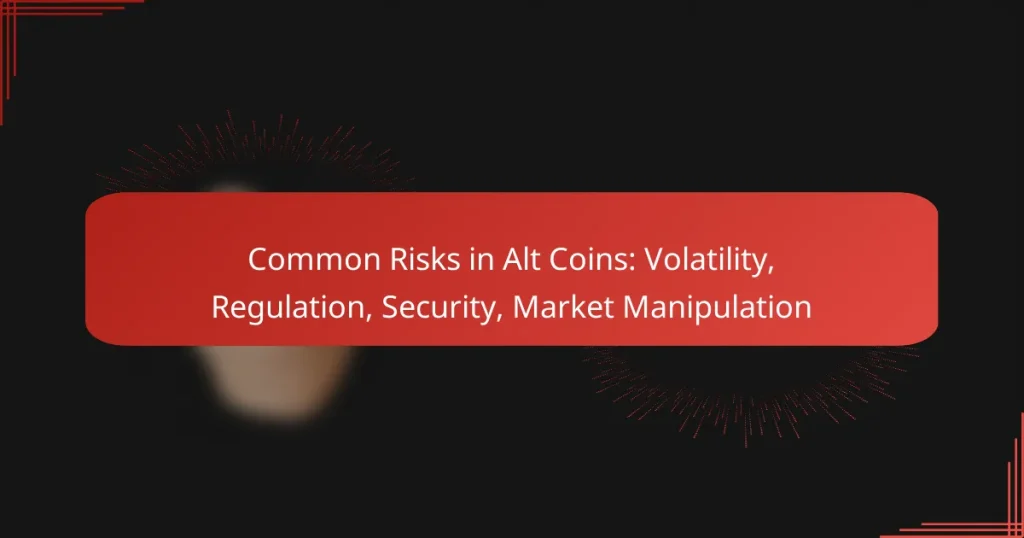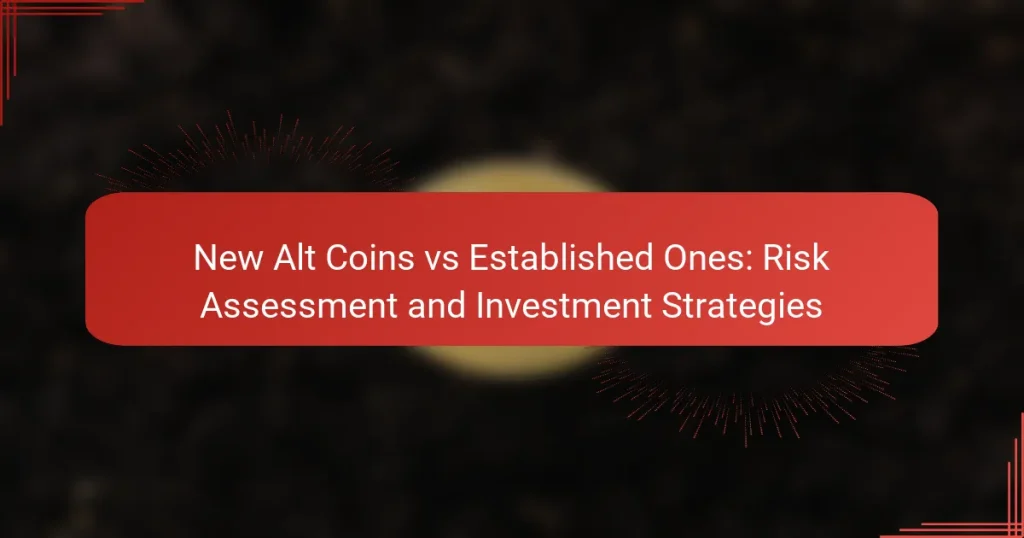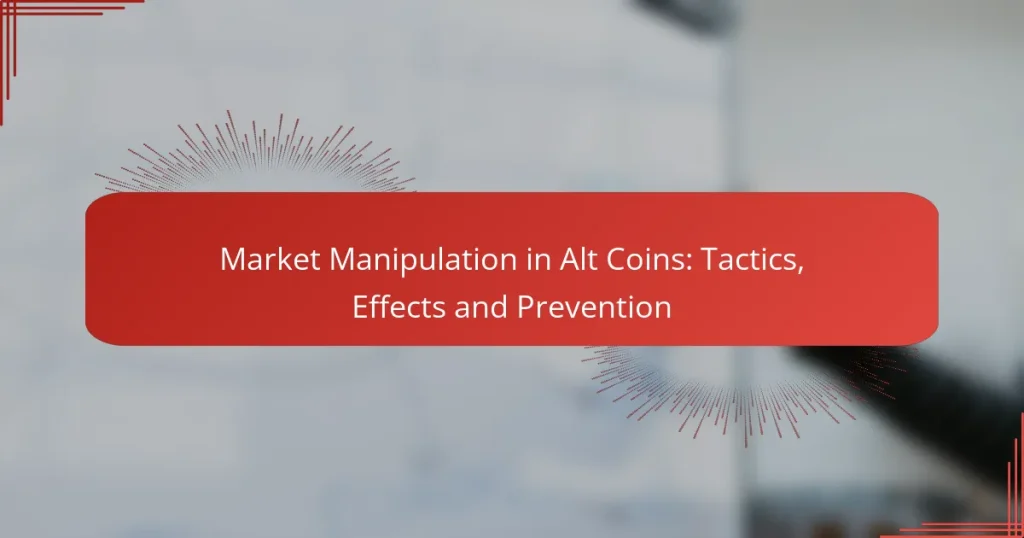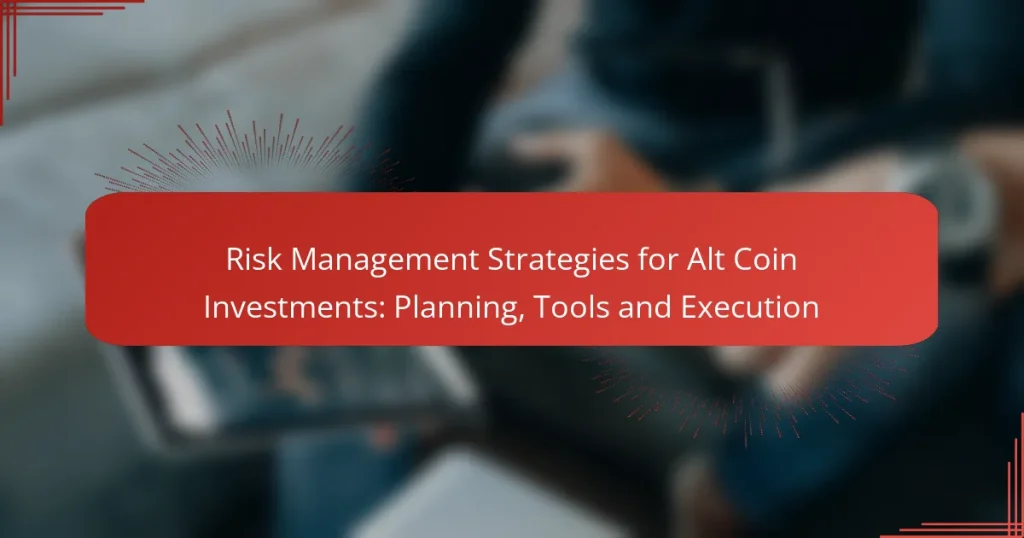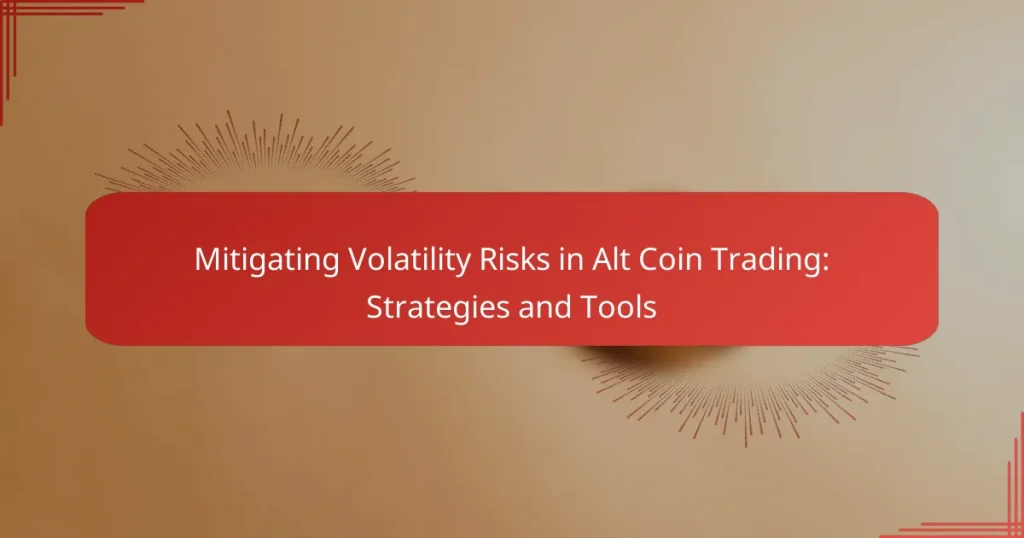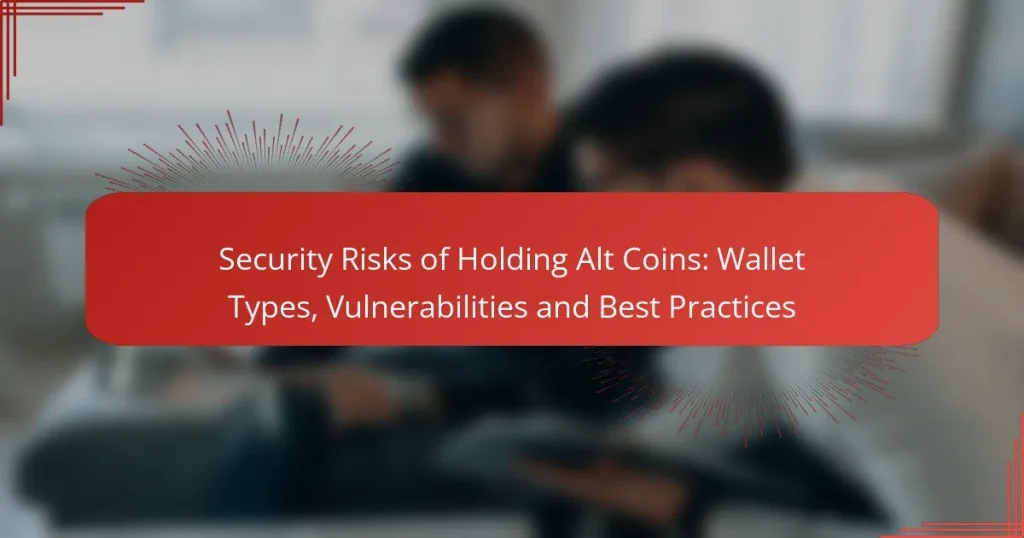Investing in altcoins presents unique risks and challenges that can greatly affect potential returns. Factors such as market volatility, regulatory uncertainty, and project viability necessitate thorough research and strategic planning. By understanding these risks and employing effective investment strategies, investors can better navigate the complexities of the altcoin market.
Common Risks in Alt Coins: Volatility, Regulation, Security, Market Manipulation
New Alt Coins vs Established Ones: Risk Assessment and Investment Strategies
Market Manipulation in Alt Coins: Tactics, Effects and Prevention
Risk Management Strategies for Alt Coin Investments: Planning, Tools and Execution
Mitigating Volatility Risks in Alt Coin Trading: Strategies and Tools
Security Risks of Holding Alt Coins: Wallet Types, Vulnerabilities and Best Practices
What are the risks of investing in altcoins?
Investing in altcoins carries several risks that can significantly impact returns. These include market volatility, lack of regulation, security vulnerabilities, liquidity issues, and project viability, all of which require careful consideration before investing.
Market volatility
Altcoins are known for their extreme price fluctuations, often experiencing rapid gains or losses. This volatility can be influenced by market sentiment, news events, and trading volume, making it crucial for investors to stay informed.
For example, a sudden announcement regarding regulatory changes can lead to sharp declines in value. Investors should be prepared for potential price swings of 10% to 30% or more within short periods.
Lack of regulation
The altcoin market is less regulated than traditional financial markets, which can expose investors to fraud and manipulation. Without oversight, projects may operate without accountability, making it difficult to assess their legitimacy.
Investors should conduct thorough research on projects and their teams, looking for transparency and compliance with local laws. Engaging in communities and forums can provide insights into the project’s credibility.
Security vulnerabilities
Altcoins can be susceptible to hacking and security breaches, which can lead to significant financial losses. Weaknesses in smart contracts or exchanges can be exploited, resulting in stolen funds.
To mitigate these risks, investors should use reputable wallets and exchanges, enable two-factor authentication, and keep their private keys secure. Regularly updating software can also help protect against vulnerabilities.
Liquidity issues
Many altcoins have lower trading volumes compared to major cryptocurrencies like Bitcoin or Ethereum, leading to liquidity challenges. This can make it difficult to buy or sell assets without affecting the price significantly.
Investors should consider the trading volume and market capitalization of an altcoin before investing. A good rule of thumb is to avoid coins with daily trading volumes below a few hundred thousand dollars.
Project viability
The success of an altcoin largely depends on the project’s fundamentals and long-term vision. Many projects may lack a clear use case or sustainable business model, leading to potential failure.
Investors should evaluate the project’s whitepaper, roadmap, and community support. Engaging with the development team and assessing their track record can provide insights into the project’s likelihood of success.
How to mitigate risks in altcoin investments?
To mitigate risks in altcoin investments, diversify your portfolio, conduct thorough research, use reputable exchanges, and set investment limits. These strategies help protect your capital and enhance your chances of success in a volatile market.
Diversification strategies
Diversification involves spreading your investments across various altcoins rather than concentrating on a single asset. This approach reduces the impact of poor performance from any one coin on your overall portfolio. Aim to include a mix of established coins and promising newcomers to balance risk and potential rewards.
A common strategy is to allocate a specific percentage of your total investment to different categories, such as large-cap, mid-cap, and small-cap altcoins. For instance, you might invest 50% in large-cap coins, 30% in mid-cap, and 20% in small-cap to achieve a balanced risk profile.
Conducting thorough research
Conducting thorough research is crucial before investing in any altcoin. This includes analyzing the project’s whitepaper, understanding its use case, and evaluating the team behind it. Look for transparency and a clear roadmap, as these factors can indicate the project’s potential for success.
Additionally, consider community engagement and market sentiment. Platforms like Reddit and Twitter can provide insights into how the community perceives a project, which can influence its future performance. Always cross-reference information from multiple sources to ensure accuracy.
Using reputable exchanges
Using reputable exchanges is essential for secure altcoin trading. Choose platforms that have a strong track record, robust security measures, and positive user reviews. Well-known exchanges like Coinbase, Binance, and Kraken are often recommended due to their reliability and compliance with regulations.
Be cautious of lesser-known exchanges, as they may lack proper security protocols, increasing the risk of hacks or scams. Always enable two-factor authentication (2FA) and withdraw your assets to a secure wallet when not actively trading.
Setting investment limits
Setting investment limits helps manage risk and prevents emotional decision-making. Decide in advance how much capital you are willing to invest in altcoins and stick to that amount. A common guideline is to invest only what you can afford to lose, typically no more than 5-10% of your total investment portfolio.
Establishing stop-loss orders can also protect your investments by automatically selling an asset when it reaches a predetermined price. This strategy can help minimize losses during market downturns and maintain discipline in your trading approach.
What challenges do investors face in the altcoin market?
Investors in the altcoin market encounter various challenges that can significantly impact their investment decisions. These challenges include identifying credible projects, understanding the underlying technology, navigating market manipulation, and adapting to regulatory changes.
Identifying credible projects
With thousands of altcoins available, distinguishing between legitimate projects and scams can be daunting. Investors should look for established teams, clear whitepapers, and active communities as indicators of credibility.
Conducting thorough research on a project’s background, partnerships, and market presence can help mitigate risks. Utilizing resources like crypto forums and review sites can provide insights into the project’s reputation.
Understanding technology
Many altcoins are built on complex technologies that may be difficult to grasp for average investors. Understanding the fundamentals of blockchain technology, consensus mechanisms, and unique features of each coin is crucial for informed decision-making.
Investors should familiarize themselves with terms like smart contracts, proof of stake, and decentralized finance (DeFi) to better assess the potential of various altcoins. Online courses and tutorials can be beneficial for those looking to deepen their knowledge.
Market manipulation
The altcoin market is susceptible to manipulation due to its relatively low liquidity compared to major cryptocurrencies like Bitcoin. Practices such as pump-and-dump schemes can lead to significant losses for unsuspecting investors.
To protect themselves, investors should be cautious of sudden price spikes and conduct due diligence before making trades. Setting stop-loss orders can also help limit potential losses in volatile market conditions.
Regulatory changes
Regulatory environments for cryptocurrencies vary widely across countries and can change rapidly. New regulations can impact the legality and trading of altcoins, affecting their value and accessibility.
Investors should stay informed about regulatory developments in their region, as well as globally, to anticipate how these changes might affect their investments. Following reputable news sources and joining crypto communities can provide timely updates on regulatory issues.
What are the best practices for investing in altcoins?
To invest successfully in altcoins, focus on thorough research, risk management, and staying informed about market dynamics. Implementing best practices can help mitigate risks and enhance potential returns.
Staying updated on market trends
Keeping abreast of market trends is crucial for altcoin investors. Regularly monitor news sources, social media, and cryptocurrency exchanges to understand price movements and emerging technologies.
Utilize platforms like CoinMarketCap or CoinGecko to track market capitalization, trading volumes, and price changes. Setting up alerts for significant market shifts can also help you react promptly to opportunities or threats.
Engaging with community forums
Participating in community forums can provide valuable insights and diverse perspectives on altcoin investments. Platforms like Reddit, Telegram, and Discord host active discussions where investors share experiences and strategies.
Engagement in these communities can help you gauge sentiment around specific altcoins and uncover potential risks or rewards. Be cautious, however, as not all advice may be reliable; always cross-reference information before making decisions.
Utilizing analytical tools
Analytical tools can enhance your investment strategy by providing data-driven insights. Tools like TradingView or CryptoCompare offer charting capabilities and technical analysis features that can help identify trends and potential entry or exit points.
Consider using portfolio trackers to manage your investments effectively. These tools allow you to monitor performance, assess risk exposure, and make informed adjustments based on market conditions.
How does geographical location affect altcoin investments?
Geographical location significantly impacts altcoin investments due to varying regulations, market access, and economic conditions. Investors must consider local laws, taxation, and the overall cryptocurrency ecosystem when making investment decisions.
Regulatory environment
The regulatory environment surrounding altcoin investments varies widely by country and can influence market stability and investor protection. In some regions, cryptocurrencies are fully embraced with clear guidelines, while in others, they may face strict restrictions or outright bans.
For example, countries like Switzerland and Singapore have established favorable regulations that encourage innovation and investment in cryptocurrencies. In contrast, nations such as China have imposed heavy restrictions, limiting trading and ICO activities.
Investors should stay informed about their local regulations and any changes that may arise. Engaging with legal experts or financial advisors familiar with cryptocurrency laws can help navigate these complexities and avoid potential pitfalls.

